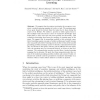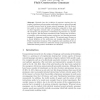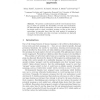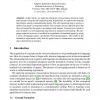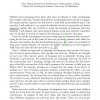EELC
2006
13 years 8 months ago
2006
Abstract. We suggest that the primary motivation for an agent to construct a symbol-meaning mapping is to solve a task. The meaning space of an agent should be derived from the tas...
EELC
2006
13 years 8 months ago
2006
Abstract. According to the functional approach to language evolution (inspired by cognitive linguistics and construction grammar), grammar arises to deal with issues in communicati...
EELC
2006
13 years 8 months ago
2006
Research into the evolution of grammar requires that we employ formalisms and processing mechanisms that are powerful enough to handle features found in human natural languages. Bu...
EELC
2006
13 years 8 months ago
2006
Abstract. We present a mathematical model of cross-situational learning, in which we quantify the learnability of words and vocabularies. We find that high levels of uncertainty ar...
EELC
2006
13 years 8 months ago
2006
The Human Speechome Project is an effort to observe and computationally model the longitudinal course of language development for a single child at an unprecedented scale. The ide...
EELC
2006
13 years 8 months ago
2006
The inflection of words based on agreement, such as number, gender and case, is considered to contribute to clarify the dependency between words in a sentence. Our purpose in this ...
EELC
2006
13 years 8 months ago
2006
How does a shared lexicon arise in population of agents with differing lexicons, and how can this shared lexicon be maintained over multiple generations? In order to get some insig...
EELC
2006
13 years 8 months ago
2006
In this article, we study the emergence of associations between words and concepts using the self-organizing map. In particular, we explore the meaning negotiations among communica...
EELC
2006
13 years 8 months ago
2006
nstructional schemas, both specific and abstract. Children are thought to start out with concrete pieces of language and to gradually develop more schematic constructions. All cons...
EELC
2006
13 years 8 months ago
2006
We present a neural-competitive learning model of language evolution in which several symbol sequences compete to signify a given propositional meaning. Both symbol sequences and p...
